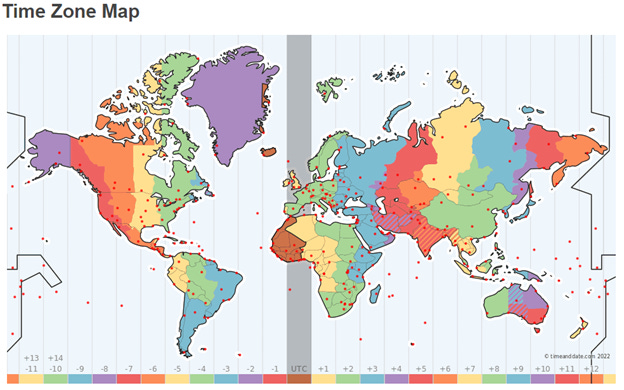Many things in life are inflicted upon us that are irritating, aggravating, and infuriating. Taxes, of course, are an obvious example. And then there's Daylight Savings Time (DST). In 2022 we did the "fall back" on November 6, and in 2023 will “spring forward” on March 12. Twice a year we must all go through the tedious ritual of resetting all our clocks, both the physical ones and the internal ones inside our bodies. And there's ample evidence out there that this semi-annual clock reset causes big-time sleep deprivation that harms us in many ways.
One of the big reasons for implementing DST was that it supposedly saves energy. That might have been valid decades ago when most lighting was done with energy-guzzling incandescent bulbs, but no more. Today we all have electronic gizmos and appliances that run continuously. Furthermore, it can be argued that DST causes more energy use, because the biggest electrical consumer of all is air conditioning, which probably gets run longer due to greater activity while the sun is up.
And so, there is talk all around the nation to abolish DST. Read about it here.
Granted, DST does have its advantages. With that extra hour of daylight in the afternoon, we tend to get more stuff done. And there are a few niche businesses that actually profit from it, such as golf, barbecue, and home improvement suppliers. They lobby the government heavily to maintain the status quo.
One particularly silly proposal making the rounds is year-round DST. The politicians and talking heads make it sound like they are waving a magic wand creating an extra hour of daylight for all out of thin air. DST, of course, does nothing of the sort; it merely tricks us all into starting our day earlier, thereby "shifting" an hour of otherwise wasted daylight from early morning to late afternoon. But, it only makes sense in the summertime. DST in the wintertime is pure tomfoolery, for it would mean we start our workday or school-day in ice cold, pitch black pre-dawn darkness many hours before sunrise.
Another silly aspect of year-round DST is that it makes the time displayed on our clocks very… arbitrary. Instead of synchronizing your clock with the sun, it all becomes set via politics. And if politicians can make clocks say whatever they want, then why not double, or triple, or quadruple DST?
Even if we continue resetting our clocks semi-annually, the dates to do so are also terribly arbitrary. Originally, those dates aligned with the spring and fall equinoxes. But from whence came November 6, 2022? That's six weeks after the fall equinox! Answer: politics.
The bottom line is: however we manage our clocks, there are drawbacks. Resetting them twice a year sucks bigtime. Leaving them permanently on Standard Time will "waste" an hour of daylight every summer morning. And permanent DST is ridiculously arbitrary and anyway doesn't work in the winter.
Thus, I propose a radical idea that goes above and beyond all the forementioned ideas - hence the "… and more" in the title of this article: I propose that we abolish time zones, and the whole planet simply adopts Universal Time (i.e. the time in Greenwich, England).
Whoa, you're probably thinking: That's nuts!
Well, let's start at the beginning. What is a time zone?
The purpose of time zones is to "sync up" the sun with our clocks, a task complicated by the fact that the earth is round (sorry, flat-earthers). So, no matter where you are on Earth, when your clock reads "noon", the sun is at its highest point. And when we flip the calendar from "today" to "tomorrow," it happens in the middle of the night.
Presently, the earth is divided into 24 time zones, each averaging 15° of longitude, which is about 1,037 miles at the equator. We could divide the earth into any number of zones; the more you have, then the more accurate the solar synchronization. But the more zones you have, then the more complicated life becomes, especially for travelers. Thus we have to find a "compromise" between celestial accuracy and societal convenience, and throughout the ages, having 15° wide zones has been a pretty good balance.
Here is a time zone map (view it interactively at www.timeanddate.com/time/map/).
Note that none of the time zone boundaries run straight north-and-south all the way from pole-to-pole. Rather, they zig and zag all over the place, so to avoid running boundaries down the middle of populated areas, and follow various geographic features. The closest one to "perfect" is the boundary between UT minus 9 and 10, hugging the border between Alaska and Canada; but even it makes a little jog to line up better with the borderline. In the battle between accurate celestial synchronization versus societal convenience, the latter often wins.
The United States, at about 3,000 miles wide from east to west, has four time zones. These zones were actually established by the railroads, not by the government.
One particularly interesting anomaly on the time zone map is China. The entire country, which is geographically as wide as the United States, is all one huge time zone! You might say that China is an extreme example of where, evidently, nobody cared much about celestial synchronization.
You could thus say that having just one global time-zone takes societal convenience to its ultimate conclusion.
First of all, how important is celestial synchronization? Well, it all harkens back to an age when everybody was a farmer. Today we live in an electronic, digital, inter-connected, global age of 24-7 activity, where ubiquitous lights have vanquished the darkness of night, and we routinely travel and communicate with anyone, anywhere, anytime. Converting dates and times to the appropriate zone is a pain and a nuisance. Wouldn't airline travel be oh-so-much simpler if the departure and arrival date-times were always in the same zone, regardless of where you are going?
Also, in a one-time-zone world, we wouldn't need the International Date Line (IDL) either. The IDL is necessitated by the fact that the "midnight" longitude is constantly on the move as the earth rotates. The line makes some crazy gyrations in the southern Pacific so to keep some scattered island groups together. So without it, the whole planet can simultaneously be "Monday" or whatever. Ship and airplane travelers could forget the whole messy complication.
So you're probably thinking: wait a doggone minute! My workday normally starts at 8:00 am. I live in Houston, Texas, which is UT minus 5. At my longitude, 8:00 UT occurs one hour after midnight. Would my normal workday start an hour after midnight?!?
Um, no. In a one-time-zone world, the sun still has influence over our lives. Each longitude would have its own "custom" typical daily schedule, based on the sun. Take a look at this chart:
This chart depicts a typical, average, ordinary day for a citizen of Planet Earth, the things he/she does, and when. All times are yearly averages, aka "equinox" times.
Start with Greenwich, England (offset zero). If you live there, we see that the sun rises at 0600, you go to work at 0800 (2 hours after dawn), eat lunch at noon, leave work at 1700 (an hour before dusk), the sun sets at 1800, you go to bed at 2200, and midnight is at 2400. We'll come back to the daily calendar flip later.
Skip down to Houston, Texas (UT minus 5). If you live there, in a one-time-zone world, you'd still go to work two hours after sunrise, eat lunch at noon, leave work an hour before sunset, etc, etc. Your day is still synced up with sun; it's just that your watch will say "13:00" when you go to work, and "17:00" when you eat lunch, "22:00" when you leave work, etc.
If you lived in Beijing, China (UT plus 8) then your watch will say "24:00" when your workday starts, and "4:00" at lunchtime, and so on. For any longitude, you have to know the "customs", and it's all based on the sun.
The one aspect of a one-time-zone world that is somewhat (shall we say) quirky would be the daily calendar flip. Under our present 24-time-zone world, we all flip our calendars from, say, "Monday" to "Tuesday" (or from "today" to "tomorrow") in the middle of the night when most everyone is asleep. But in a one-time-zone world, only Greenwich's longitude would do it at midnight. For everyone else, UT 2400 will come at various odd times. In Houston, "Monday" would become "Tuesday" in the early evening. In Beijing, it occurs mid-morning.
So there you have it: The ultimate proposal to simplify the lives and daily routines of everybody around the globe. No, it doesn't solve the problem of the "wasted" hour of summer morning sunlight, but that's outweighed by numerous other advantages. Let's do it, get rid of DST, and stop the politicians from mucking with our clocks.













Thank you for this article. I would like to know just who benefits now from keeping DST. Since inception, the number of days/months that DST takes has increased. Who benefitted from the increase? The entire notion of DST reeks of human manipulation and it's insulting, yet typical. The concept that humans know better than the solar system [on which the calendar is based] is credit to human arrogance.
Time itself is an arbitrary human construct and isn't "natural". Moreover, the need to synchronize "time" is arbitrary. It made more sense in the industrial age when shifts of manual labor needed to be at the same place to start work. It makes less sense now in a digital era when collective effort need not necessarily be synchronized. But while getting away from clocks altogether is still a long way off, we can and should break these arbitrary paradigms where we can. Each human on the planet has an optimal cycle for sleep, bodily functions, eating, working, thinking and play - and these change with the seasons, sunlight, moon phases - and gradually throughout our lives. Yet we dictate "when" things happen based on an arbitrary "clock" that tells us when it's okay to do whatever. Nothing else in nature works this way - just humans.